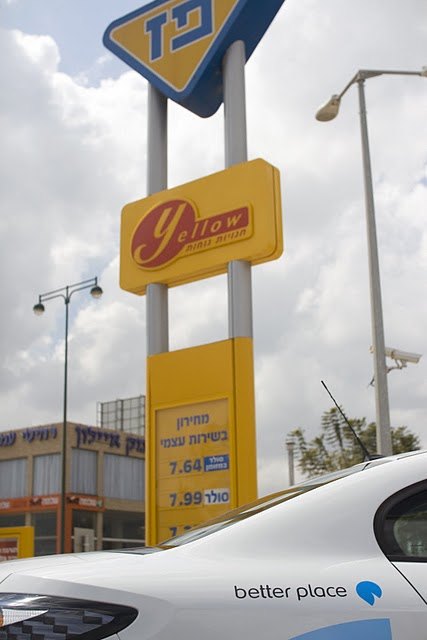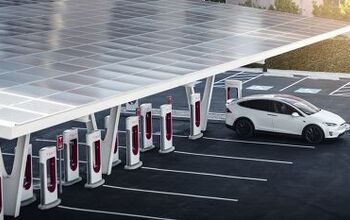Better Place Announces Business Plan, Signs Israeli Lease Deal
One of the biggest clouds hovering over Better Place’s venture in Israel – and globally – is what stands behind the well-prepared presentations and thoroughly thought out, customer-oriented marketing. What makes the seemingly adventurous venture appealing to the business hounds investing their best capital in it? Such questions from journalists are usually answered with a neat smile, a corporate joke and a dry statement.
While Better Place still isn’t revealing its global business plan, it finally sheds some light on the numbers behind its Israeli venture, as part of a worldwide roadshow in preparation for the company’s upcoming $300 million capital raising.
While I’m not going to bore you with all the figures and upward-pointing graphs, Better Place’s presentation does contain some interesting figures. For example – for the first time ever – the company reveals the cost of its swappable battery pack: 9,900 euros – which are about $14,000 – and a declared range of 290,000 kilometers, which translates to a little over 180,000 miles before the battery is sent to a world full of good.
According to the company, the total cost of implementing its solution in Israel – including the construction of battery swap stations, charge spots and service centers – is 240 million euros. To return the investment, Better Place will need to sign up 30,000 4-year contracts – making a profit of 8,600 euros per customer travelling 25,000 annual kilometers, or about 15,000 miles. We’ve already pointed out in previous reviews of Better Place’s Israeli venture that this mileage is significantly higher than the Israeli average – which stands at about 10,000 annual miles – which further reinforces the notion that Better Place targets its services towards company car fleets that tend to travel a lot more.
Unsurprisingly, this renders Shai Agassi’s past claims about the tremendous future popularity of the electric car quite obsolete. Last January, in an interview to Associated Press, Agassi claimed that by 2016, “plus or minus a year”, more electric cars would be sold than their gasoline counterparts. The current projections published by the company are much more sober, starting with an optimistic 0.1% share of total car sales this year (about a 1,000 cars), 0.2% in 2012 and then a gradual, one-percent-a-year rise – from 1% in 2013, to 4% in 2016 and 8% in 2019, which is quite a distance from Agassi’s ludicrous statement.
But as I’ve concluded in the review of Better Place’s pricing scheme, even to reach these relatively modest numbers, Better Place “needs to provide peace of mind to its customers by introducing some sort of a buyback program and by leasing the car through third-party vendors like the vast majority of its competition. Until then, the electric car for everybody will remain just what it is now – a vision.”
And apparently, Better Place has decided to take my advice and do just that, by signing a contract for the sale of 500 Renault Fluence Z.Es to the Israeli leasing company Albar (also the local operator of the Thrifty franchise). The timing is hardly incidental, as Better Place is keen to prove its viability to its investors and fulfill its own goal of putting electric cars on the road by the end of the year. While 500 cars are barely a dot in Albar’s account books – being one of the largest companies of its kind in Israel – for Better Place, which has had some unsuccessful negotiations with leasing companies in the past, this serves as an important milestone in the pothole-filled road of making their solution a reality.
This is how the deal is going to work: Albar will lease the cars to various companies – likely to the tens of companies that have previously signed a memorandum of understanding with Better Place – while Better Place will offer its charging, battery replacement and customer service package separately. It’s likely that as with most leasing contracts in Israel, Albar will cater for the cars’ maintenance while the lessees themselves will pay for the gas electricity package, in exchange for the employees waiving a handful of benefits.
The catch here is twofold: one, Better Place is likely to offer heavily discounted pricing for massive orders – both for the car itself and for the service package. And two – perhaps even more importantly – it will buy the cars back from Albar when the contract is over, thus removing any worries about the car’s future second hand value. While the cost of the lease itself is still not clear, it will almost definitely be equal to the leasing price of a standard Renault Fluence – about $680/month, depending on the size of the order.
So why doesn’t Better Place just pass these discounts on to the private customer? Because it knows it doesn’t stand a chance. To make any impact in the fleet market, Better Place needs to match the significant discounts that are a regularity in the business, and it won’t be able to do so without setting a high initial price for the car and service. Without tending to fleet sales, Better Place will never be able to reach the sales figures it now speaks of – not only because fleet purchases make up most of the car sales in Israel, but also because the vast majority of Better Place’s potential customer base – those that drive higher-than-average annual mileages – belong to these fleets.
At the end of the day, neither of these two announcements is breaking news, but rather an attempt by the company to stick a peg firmly in the uneven ground that is the Israeli auto market, by putting cars on the road and backing their Israeli venture with figures and not just blank statements filled with adjectives. We’ll have to wait and see if these promises are hopeless optimism or a carefully crafted business plan.
More by Tal Bronfer
Latest Car Reviews
Read moreLatest Product Reviews
Read moreRecent Comments
- James Jones The only thing that concerns ,me is a government-mandated back door--you get in and your car drives you to the police station where yo are arrested for crimes against the state, or "you can't drive because we must achieve our energy conservation goals". Not to mention that once there's a back door, any sufficiently smart person can use it--you can't create a back door only usable by those whose hearts are true. So then there'd be the risk of someone telling my self-driving car to drive off the side of a mountain/into a river/etc.
- 3-On-The-Tree Jeff I also have a 1980 Suzuki GS1000G I rode during college and it was a lot of fun. My other bike was a 1977 Suzuki GT 750 2 stroke. My post army retirement time will be restoring those old bikes next to the 02 Hayabusa, 05 Suzuki Vstrom and klr 650. I love riding but at much reduced speeds nowadays. I got it out of my system as a young flight Lieutenant.
- Canam23 I really like the Rivian, but no matter what it's payload is, it will be completely weighed down by smugness if they team up with Apple.
- Fed65767768 Good Christ, no.CP.
- Kwik_Shift_Pro4X The main advice I've heard is to stay away from the BMW engine.

































Comments
Join the conversation
"Shai Agassi’s past claims about the tremendous future popularity of the electric car" included . . . ALL ELECTRIC CARS, sold by . . . ALL COMPANIES, in . . . ALL COUNTRIES. Shai never claimed to be anything but a catalyst of change, an entrepreneur overcoming obstacles. . . . His GOAL: to replace OIL with "Renewable ENERGY" World Wide, . . . . . . needs him to show how it can be done, NOT do it.